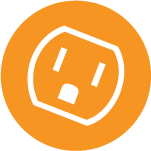Uses of Vapor Tight Lighting
Uses of Vapor Tight Lighting
Vapor-proof LEDs (light emitting diodes) effectively seal against corrosive fumes, non-combustible dust, various gases, and moisture. This makes them ideal for harsh environments.
With sealed, gasketed components, vapor proof light fixtures are energy efficient lighting that requires minimal replacement and maintenance.
What does vapor tight mean?
Vapor tight refers to a light fixture's ability to resist moisture ingress, ensuring it remains shielded from outside forces. The robust housings of LED vapor tight lights are designed to protect their components.
Types of Vapor Proof LED Light Fixtures
Linear vapor tight led lights use LED tubes or a channel of mini led diodes behind the vapor tight barrier. The covering of the light source protects it, even if the tubes aren't damp location rated.
Jelly jar light fixtures, also called vapor jar lights, feature sealed glass or plastic enclosures. These enclosures shield bulbs and electrical components from moisture, dust, and debris.
They're ideal for outdoor and industrial use. Jelly Jar lights are most effective in locations such as parking structures, staircases, car cleaning facilities, airports, and shopping malls. These are mostly where exposure to extreme weather conditions is constant.
Recommended Products
Where to use vapor tight lighting
Vapor-proof LED lights are used in many industrial and commercial settings. They are basically used anywhere that moisture, dust, or corrosive elements can be present. Here's some common uses of vapor tight fixtures:
- Outdoor Areas: Vapor-proof LED lights are commonly used outdoors. They can be used in parking lots, building exteriors, and walkways. Mostly to provide strong and long-lasting light even when it's raining or windy.
- Industrial Facilities: They're widely used in factories, warehouses, and manufacturing plants. Typically, places where there's lots of moisture, dust, or chemical vapors. These lights can handle tough environments without losing their brightness.
- Food Processing Facilities: Vapor-proof LED lights work well in food processing plants and commercial kitchens. This is because these places operate around staying clean and resisting moisture. They give bright, reliable light while keeping things hygienic.
- Parking Garages and Tunnels: They are built to handle moisture and dust. Vapor-proof LED lights are often used in parking garages, tunnels, and underground passages. These places are common for their chances where regular lights might get damaged.
- Transportation Centers: They're installed in places like airports, train stations, and bus terminals. Their installations in these places help them to give safe and dependable light in areas that get wet or dusty.
- Hazardous Locations: They are assembled in places where there might be flammable gases or vapors. Some of these places can include, chemical plants or refineries. Vapor-proof LED lights with the right safety certifications might be needed to keep things safe.
Benefits of vapor tight lighting
Vapor Proof LED light bulbs offer a wide range of benefits to suit indoor or outdoor light needs. Some benefits include:
- Exceptional durability and resistance to moisture, suitable for outdoor and industrial applications when compared to incandescent bulbs.
- Long Lifespans from 50,000 up to over 100,000 light hours when used 12 hours daily.
- Energy-efficient, reduced maintenance costs and long-lasting, providing users with many benefits over time.
- Consistent, bright light outputs that ensures optimal color temperatures and visibility in various environments.
- Promotes safety by withstanding harsh conditions and minimizing the risk of performance issues.
Potential negatives of LED vapor proof lighting
Although LED vapor proof lights have many benefits, there are some other factors that you may need to consider:
- Higher upfront cost compared to standard LED lights bulbs. Cost can change based on ceiling height, service fees, and weather conditions.
- Limited design options available compared to standard LED fixtures, which may restrict aesthetic choices.
What does IP Rating mean?
Safety measures called IP ratings help make these fixtures identifiable by users. These IP ratings include IP65, IP66, and IP67. IP (Ingress Protection) ratings indicate a fixture's resistance to solid materials and liquids.
The first number shows how well the fixture blocks hazards, like dust. The second number tells you how well it keeps out liquids, like water. For vapor-proof lights, consider the amount of exposure to water. IP65 guards against water jets, IP67 protects against temporary submersion, and IP68 ensures safety for permanent submersion.
Recommended Reading
Transform your space with LED vapor tight lights by first ensuring the power is off, then securely mount the fixture and connect the wiring following the manufacturer's instructions.
Vapor-proof LED tight lights excel in durability and resistance to moisture and dust, providing reliable illumination in demanding environments while offering long-term savings on energy and maintenance costs. However, their higher initial purchase price and the importance of proper installation may be considerations for potential users.
In a concise overview, LED vapor-tight lights provide resilient lighting solutions tailored for environments with moisture or dust concerns, ensuring efficient and durable illumination when professionally installed.
Shop lights affix to chains and hang from the ceiling. To change your old fluorescent tubes to LED shop lights, you can retrofit or replace your fixture.
Recommended Products
Receive special deals and more, right to your inbox
Receive special deals and more, right to your inbox









